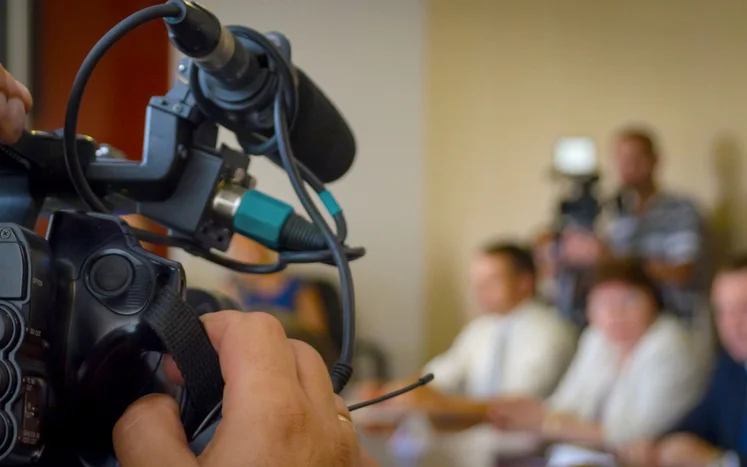Advanced Legal Videography for Arbitration Hearings.
Advanced Legal Videography for Arbitration Hearings.
Blog Article
The Duty of Lawful Videography in Depositions and Tests
Legal videography has actually arised as a necessary tool in both depositions and trials, offering a diverse method to recording witness statements. As legal professionals significantly recognize its worth, it motivates a much deeper evaluation of just how these visual documents can influence juror perceptions and test results.
Relevance of Legal Videography
Lawful videography plays a pivotal function in the documents and presentation of depositions and tests. This customized field incorporates technical skills with lawful knowledge to develop a trusted record of process that can significantly affect case outcomes. The visual element of legal videography improves the understanding of witness statement, permitting jurors and judges to observe not just the spoken words but additionally the disposition, feelings, and body movement of the witnesses.

The value of lawful videography extends past the courtroom; it additionally plays an essential role in preserving proof for future recommendation, whether for appeals or more lawsuit. Its combination into the legal procedure is essential for guaranteeing a reasonable and exact representation of the facts, inevitably adding to the search of justice.

Process of Legal Videography
While capturing the subtleties of depositions and tests, the procedure of lawful videography includes a number of crucial steps that make sure high-grade, precise recordings. Initially, a professional lawful videographer prepares by examining the instance materials and comprehending the particular demands of the deposition or trial. This prep work consists of acquainting themselves with the individuals and the context, which helps in recording important information.
On the day of the recording, the videographer establishes the essential tools, which usually consists of high-def cams, microphones, and correct lights. Making certain ideal angles and audio high quality is vital, as it straight influences the efficiency of the recording. The videographer interacts with attorneys and participants to develop procedures, making certain that everyone understands the recording procedure.
Throughout the deposition or trial, the videographer thoroughly videotapes the process, paying very close attention to both verbal and non-verbal signs. legal videography. This includes catching the attitude and reactions of witnesses and attorneys. After the session wraps up, the videographer might edit the video for clearness and compliance with legal standards, producing an end product that precisely mirrors the process for future recommendation and usage in legal contexts
Benefits in Depositions
The consolidation of videography in depositions offers various benefits that improve the total procedure of collecting evidence. One key benefit is the ability to capture witness testimonies with visual and look at this web-site acoustic integrity, giving a much more accurate representation of the witness's demeanor, tone, and body language. This multidimensional approach permits attorneys and courts to assess integrity better than typical written records alone.
Furthermore, videographed depositions my latest blog post function as an effective device for protecting statement. Ought to a witness come to be unavailable for test, their tape-recorded deposition can be played in court, guaranteeing that their proof continues to be available and relevant. This facet significantly decreases the risk of shedding critical information that might impact situation end results.
Moreover, the use of legal videography promotes much better prep work for attorneys. Evaluating video clip footage enables lawful groups to evaluate and fine-tune their methods, recognizing strengths and weak points in their cases. This primary benefit can result in even more engaging discussions in court.
Lastly, videography improves the overall expertise of the deposition procedure, instilling confidence in clients pertaining to the thoroughness of their legal representation. By leveraging technology, attorneys can considerably boost the effectiveness of depositions.
Effect On Tests
In numerous trials, the integration of videography can significantly influence the presentation of proof and the jury's perception. Lawful videography captures witness testimonies and crucial proof in a vibrant style, permitting jurors to involve with the material on multiple degrees. This aesthetic part improves the narration element of a test, providing context and psychological vibration view it now that standard text-based proof may do not have.
Additionally, video recordings can act as powerful tools for impeachment during interrogation. When inconsistencies develop between a witness's previous statements and their courtroom testament, video proof supplies an unbiased reference that can persuade jurors' opinions. This immediacy and clarity can strengthen the reliability of a party's narrative while all at once weakening opposing debates.
Additionally, using videography can aid streamline complicated details, making it extra easily accessible to jurors that might struggle to understand elaborate information provided entirely through spoken testament. By combining visuals with acoustic information, legal videography can improve retention and understanding, inevitably influencing the court's decision-making procedure. Consequently, the influence of videography in tests expands past mere appearances; it plays a critical function fit the lawful landscape and results.
Future Trends in Legal Videography
As we look toward the future of lawful videography, a number of emerging patterns promise to reshape its role within the court room. One significant trend is the assimilation of expert system (AI) in video analysis and editing and enhancing - legal videography. AI can improve the procedure of determining vital minutes in videotaped depositions, enabling lawyers to quickly access pertinent content, thereby boosting effectiveness in instance prep work
Furthermore, the surge of digital fact (VIRTUAL REALITY) and augmented reality (AR) modern technologies is expected to transform exactly how jurors experience proof. By submersing jurors in a simulated setting, these technologies can offer a more extensive understanding of complicated scenarios, bring about more educated considerations.

In addition, the increasing need for remote depositions, increased by the COVID-19 pandemic, will likely proceed. Lawful videographers will need to adapt to brand-new software application and platforms to guarantee high-quality recordings in online setups.
Lastly, the growing emphasis on information security will certainly require stricter methods for keeping and sharing video clip proof. As the legal landscape progresses, lawful videographers need to remain abreast of these trends to preserve their relevance and effectiveness in the judicial procedure.

Verdict
In summary, legal videography serves a critical feature in the judicial process, improving the honesty of depositions and trials. By capturing the subtleties of witness testimonies, this medium not only preserves crucial evidence however also aids in offering info successfully to jurors. The relevance of visual documentation in evaluating reliability and assisting in cross-examination can not be overemphasized. As innovation remains to develop, lawful videography is positioned to further transform its function within the legal landscape.
Report this page